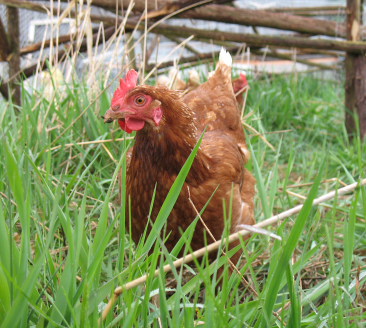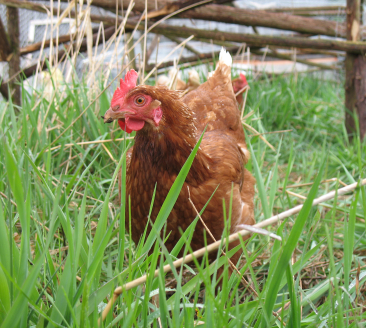 Grist’s recent Q&A with chicken expert Gail Damerow, the author of the best-selling Storey’s Guide to Raising Chickens, elicited several questions from readers. Damerow took time out from her busy farm in Tennessee to answer them via email.
Grist’s recent Q&A with chicken expert Gail Damerow, the author of the best-selling Storey’s Guide to Raising Chickens, elicited several questions from readers. Damerow took time out from her busy farm in Tennessee to answer them via email.
Q. From Jean Kaiwi: I live in the country where everyone has roosters. The local chicken guru tells everyone that hens are much more happy/healthy with roosters around. True?
A. A big advantage to having roosters is they serve as protectors of the flock. In a predator attack, the rooster is often the first one to get nabbed. However, hens can be perfectly happy and healthy without a rooster. In fact, they get along better than if they have a big rooster, or too few hens per rooster, such that the rooster denudes their backs of feathers and then wounds their skin with his claws and spurs (not out of meanness, but while breeding). It is true that a hen will sometimes take on the role of a rooster if none is in the flock, but that’s true of a lot of other species. I keep roosters with my free-ranging hens, but if I had limited space or lived where a rooster was not allowed, I would not hesitate to keep hens without one.
Q. From Steph Larsen: Storey Guide to Raising Chickens is indeed a great book, it’s on my book shelf. My one quibble is that when I try to troubleshoot with this book, I read a lot of “vaccinate for this, medicated feed for that.” But as a new grower following organic practices, I don’t know what I’m allowed to do. Some vaccines, medications and techniques are OK for organic, some are not. Same goes for my sheep. Anyone have suggestions for organic livestock books as good as this series?
A. My books cover a wide range of management methods, and since a lot of people either exhibit their chickens or periodically bring new birds (especially “rescue” chickens) into their flocks, they have to be vigilant and aggressive about disease control. Health management for organically raised livestock is a still-evolving field. This paper on “Remedies for Health Problems of the Organic Laying Flock” [PDF]offers a starting place.
Q. From jenraeb: I am eagerly waiting for the day that backyard chickens will be permitted in my city. I’m wondering about how chickens do in different seasons. Here in the DC area, we get some pretty awful summers (hot and humid) and sometimes get terrible winters (3 blizzards this past winter). Will chickens be OK in these extremes? What safeguards would I need to take to make sure they’re happy and healthy?
A. We have the same extremes where I live. In summer, make sure the chickens have shade and plenty of cool, clean water, even if you have to replace the warmed up water several times a day. In winter make sure the coop isn’t drafty and the chickens have warm, clean water. If the water freezes, replace it several times a day. We keep extra drinkers so we can bring out warm (not hot) water to the chickens, and take the cold/frozen drinker inside to thaw.
Q. From harborseal: I’m interested in raising backyard chickens but only if I can get those great tasting orange-yolked eggs. I live in SW Oregon and have tried eggs from eight backyard chicken establishments and only two have these orange yolked eggs. The rest are just like supermarket eggs even when you get them right after the owner’s done hand-washing them. What are the factors that influence the quality of the eggs? Thanks!
A. Backyard chickens laying eggs with pale yellow yolks are likely getting only bagged feed. Chickens that are free to forage will naturally lay eggs with orange yolks.
Q. From rgranville176432: I am in the process of building a chicken coop for my six chickens. I have a hardware cloth floor. I was going to fill it on top about 6 inches. Should I use sand or soil? Which is better for the chickens?
A. Chickens will take dust baths in either sand or loose soil, but sand is a lot easier to maintain than soil, provided you keep the poop raked out. If you use soil, you’ll want to top it with several inches of bedding; in digging dust holes the chickens will stir some of the soil into the bedding, so when you remove the bedding to replace it with clean bedding, you may need to add more soil to fill the holes.
Q. From Judy M.: What do you suggest for a broody hen [one who refuses to leave the egg-laying box in the hopes of hatching one]? We kept ours in a separate airy cage for four days and though she seemed better by the fourth day and for the first few days after we let her out, as the days passed she reverted to fairly obsessive brooding. For the last two weeks (since then), we’ve just been pulling her out of the coop and into the larger chicken run we have twice a day for at least two hours each time, but she does get anxious and wants to return to the coop.
A. Some hens will not be deterred, no matter what. Some things to try: hang the cage so it swings when she moves around, or house her together with a rooster. In the old days chicken keepers would dunk a broody hen in water, which is where the expression “mad as a wet hen” comes from. I’m not advocating that, just pointing out the extreme measures people have gone through to break up a broody hen.


